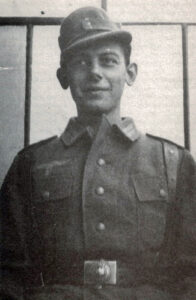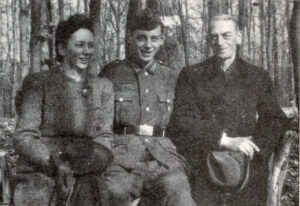Mail Correspondence with Soldiers at War (“Feldpostbriefe”): Letter from the parents to their son Joachim Rühland, German soldier in Belarus, 7 January 1944 (Published on 09/06/2022)
Feldpostbriefe and their significance today
When researching Julius Erasmus, one inevitably comes into contact with letter correspondence between soldiers at war and their families from the time of the Second World War, such correspondence being called “Feldpostbriefe” in German. Be it messages about the death of a soldier, written by his superior to his relatives, which were later sent to Mr Erasmus as a hint for a grave search, or other correspondence between soldiers at war and their families at home. Since then, I have also been dealing more closely with field post letters from that time.
Feldpostbriefe are valuable contemporary documents that unfold their timeless message, especially in times like the present, and convey a vivid impression of what war means to all involved. They are a valuable tool to ward off the very beginnings of a renewed striving for war and perhaps to help prevent history from repeating itself once again and with yet more gruesome consequences for mankind. At present, war, weapons and the killing of people on a large scale are once again being drummed up forcefully, although for decades one could have had the vague hope that mankind had finally learned its lesson to some extent from the painful experiences of two world wars in particular. Unfortunately, this does not seem to be the case once again.
With this in mind, appropriate letters or letter excerpts from various sources will be published here from time to time in the section “Mail Correspondence with Soldiers at War (Feldpostbriefe)” as a reminder of what war means to man and mankind. To provide food for thought and in the unshakable hope that this may make a difference.
Feldpostbrief from Gertrud and Wilhelm Rühland dated 7 January 1944 to their son Joachim
(source: Volksbund Deutsche Kriegsgräberfürsorge, Letzte Lebenszeichen – Briefe aus dem Krieg, p. 164 ff. [translation from German]):
“My dear Jochen!
Now we are still without mail from you, your last letter was from 13/12/. But we strongly hope that you are still well, at least in health, because otherwise you will probably have nothing to laugh about. Every day Witebsk is still mentioned in the Wehrmacht report, and we know what heavy fighting is raging there. You poor boy, you are always where it is worst. How often have I thought in these weeks, if only one could look whether he is still healthy. Have you at least received our mail? I sent almost all the letters by airmail because I thought they would get through sooner. (…) Now I will finish for today, Dad can go on a little longer, (…). So stay healthy and hopefully we will get mail from you soon. With many warm greetings and kisses I am your
mommy
My dear boy!
The fierce fighting in your section has been raging for almost four weeks now – and according to the reports of the OKW [Wehrmacht High Command] it continues with unabated ferocity. In this area alone, according to the reports so far, about 500 tanks may have been destroyed. This is the largest number of all combat sections and clearly shows the intentions of our enemy. However, as we all confidently believe, they will be defeated by the toughness and will of our brave boys. I have so often emphasized how much I would like to stand in your ranks and fight, and especially now when the going gets tough. I still believe, where the physical forces can no longer work, there my calm would create a balance and can be of use to you. However, with my 55 years these are dreams that will not find any realization. And so I have to be modest and do my duty here at home. But in my thoughts, boy, I am often very often with you and call out to you to ‘persevere’. How often this happens at night, when I wake up, and I always think that you should notice this and draw new strength from it. We miss your dear mail very much, but we know that you hardly get any rest, and if you do, then you need sleep above all, and that absolutely comes first. But we will be happy when the situation there calms down a bit and the mail traffic runs regularly again. Until then, we keep you in our prayers and hope that you will survive the present fighting safe and sound. (…)The days are now getting longer again, at first not yet noticeable, and you will see that one day the spring sun will shine again and then the hardest things will be forgotten. So keep your courage and resist your skin. (…)
Wishing you all the best, I send you my warmest greetings today.
Your father”
Fallen notice to parents, dated 25 December 1943:
“Dear Mr Rühland!
Today I have the sad duty to inform you of the painful news that your dear son, our good comrade, rider Joachim Rühland, died on 14/12/1943 in the heavy defensive battles south of Newel, in the performance of his soldierly duty, faithful to his oath of allegiance to the flag for Führer and Fatherland.
Shot in the head, your son died immediately without suffering. He was buried the same day in Kroshkina, about 20 km north of Gorodok.
I express my warmest sympathy to you, at the same time on behalf of his comrades, to whom he was always a loyal and good comrade. With him we have lost one of our best. For you the death of your dear son means an unspeakably heavy lot. May the certainty that your son gave his life for the greatness and existence of the German people and Reich be a comfort to you in the heavy sorrow that has affected you.
I greet you with the feeling of sincere sympathy
signed, on behalf, Schaaf
Lieutenant and squadron leader”
When the parents wrote the letter to their son, he had already fallen; they had not received the death notice at that time. Their letter came back on 2 February 1944, marked “ Gefallen für Groß-Deutschland. Zurück.” (“Fallen for Greater Germany. Return.”).
Joachim Rühland, born on 25 January 1925 in Braunschweig, was killed on 14 December 1943 near Kroschkina/Belarus.
(Head picture: Envelope of the parents‘ letter to their son with return note
[source: Volksbund Deutsche Kriegsgräberfürsorge, Letzte Lebenszeichen – Briefe aus dem Krieg, p. 169])
If you wish to support my work, you can do so here. Many thanks!



